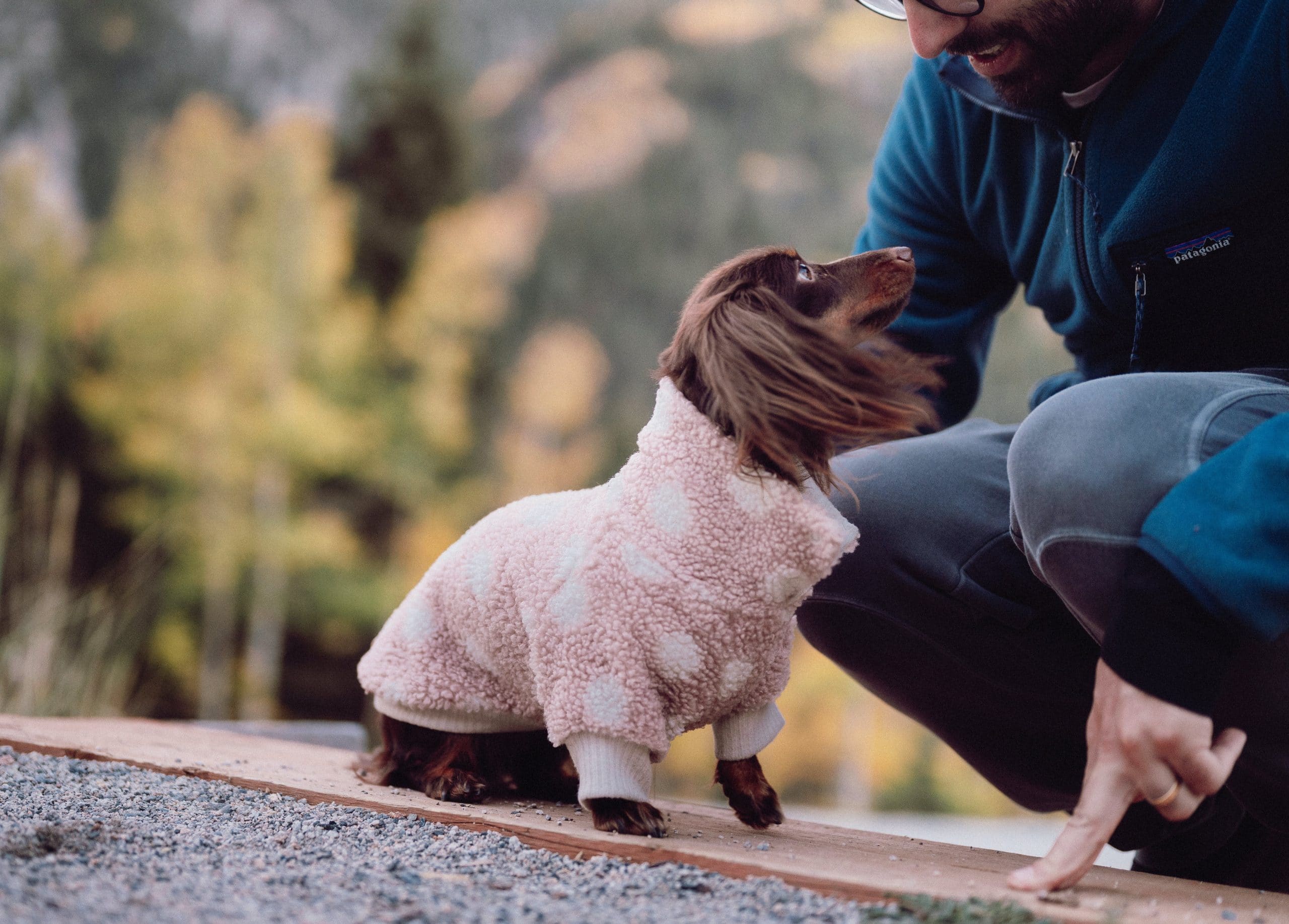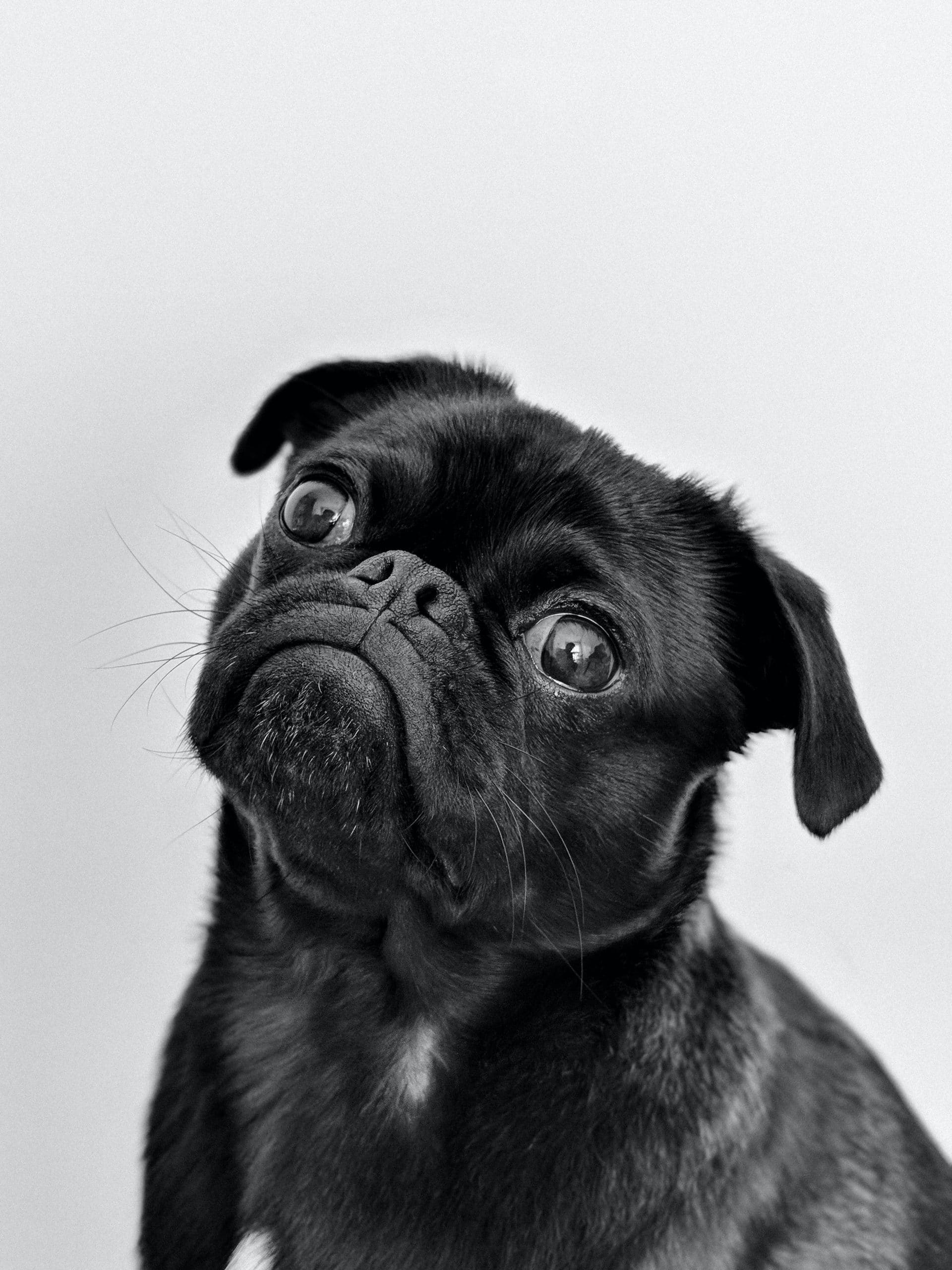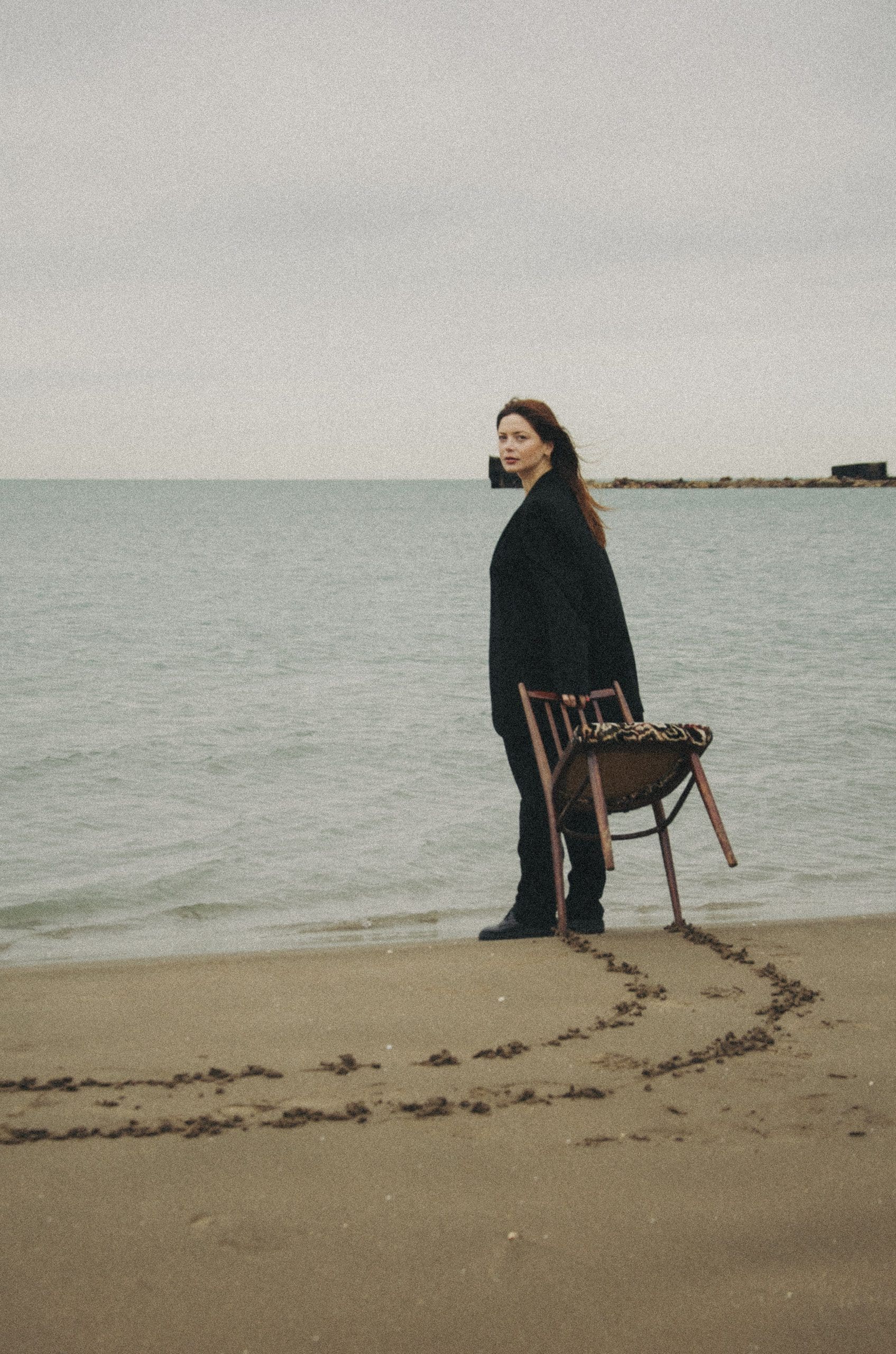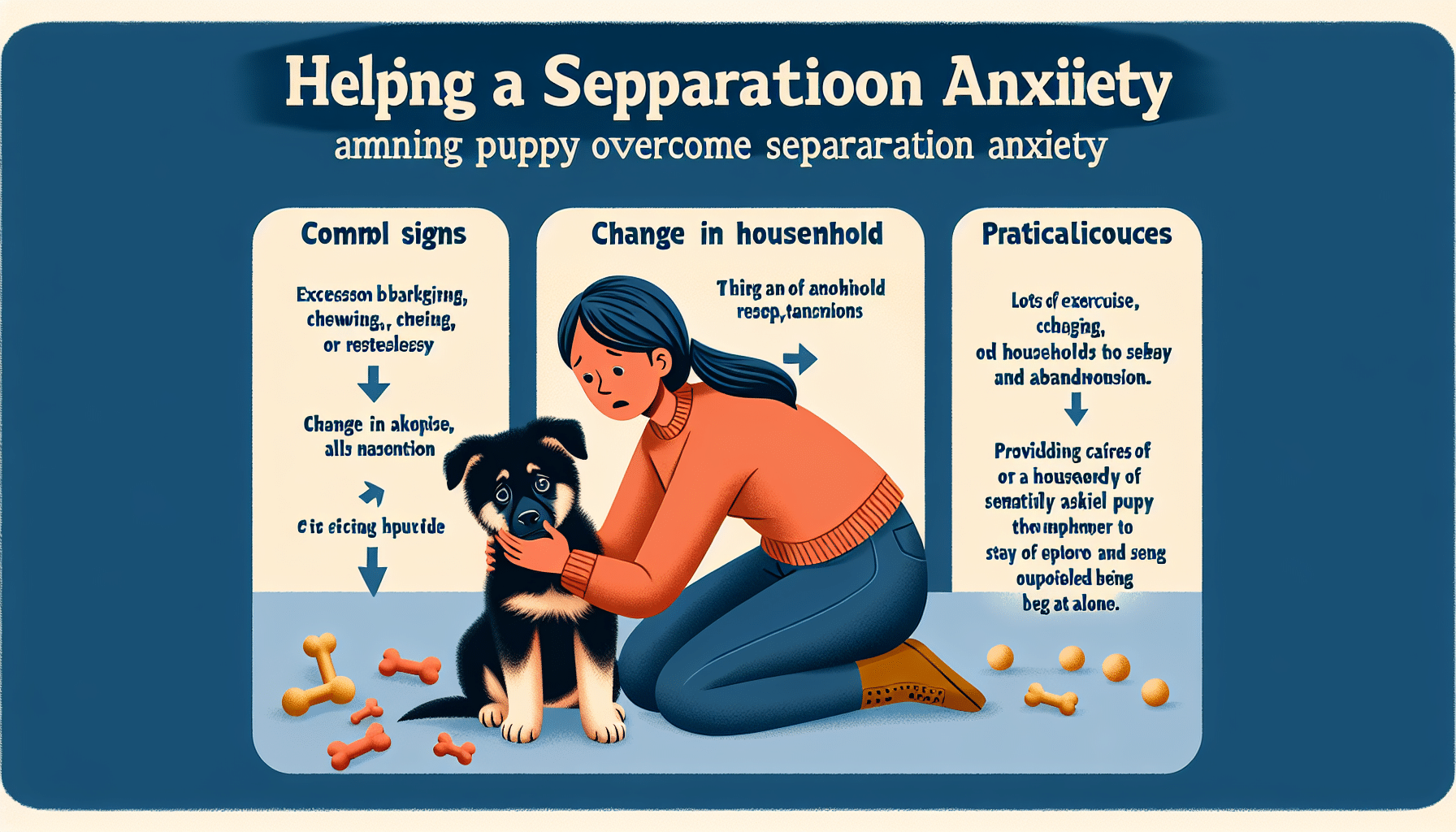Are you a new puppy owner? If so, you may be concerned about preventing separation anxiety in your furry friend. It's common for puppies to experience anxiety when left alone, but with a few helpful tips and tricks, you can nip this behavior in the bud. From gradual departures to crate training, this article will guide you through effective strategies to ensure a happy and confident pup, even when you're not around. Say goodbye to those sad puppy eyes and hello to peace of mind!

This image is property of images.pexels.com.
Creating a Calm Environment
Establishing a Routine
Creating a routine can be incredibly helpful in preventing separation anxiety in puppies. Dogs thrive on structure and predictability, so having a consistent schedule can provide them with a sense of security. Make sure to establish regular feeding times, potty breaks, exercise sessions, and playtime. By sticking to a routine, you can help your puppy feel more at ease and minimize the stress and anxiety associated with sudden changes in their daily activities.
Gradual Exposure to Alone Time
One of the most effective ways to prevent separation anxiety is to gradually expose your puppy to being alone. Start by leaving them alone for short periods of time and gradually increase the duration as they become more comfortable. This gradual exposure allows them to build confidence and learn that being alone is a normal part of their routine. Use positive reinforcement during these trial periods, providing treats or toys that they enjoy to create a positive association with alone time.
Providing a Safe Space
Having a designated safe space for your puppy can help alleviate their anxiety. This can be a crate, a specific room, or an area with their bed and toys. Ensure that their safe space is comfortable and stocked with familiar and comforting items. Gradually introduce your puppy to their safe space and encourage them to spend time there even when you are home. This will help them associate it with security and relaxation.
Using Calming Music or White Noise
Calming music or white noise can have a soothing effect on puppies and help them feel more relaxed when alone. Play gentle music or use white noise machines to create a peaceful atmosphere. The soft background noise can help drown out other sounds that may trigger anxiety, such as street noise or doorbells. Experiment with different types of music or white noise to determine what works best for your puppy.
Building Independence
Encouraging Solo Play
Teaching your puppy to enjoy independent play can help build their confidence and decrease their reliance on constant attention. Provide them with a variety of toys, chew bones, and puzzle games that they can engage with on their own. Initially, you may need to initiate play sessions and gradually fade your involvement, allowing them to explore and entertain themselves. This will teach them that time alone can be enjoyable and fun.
Leaving Toys and Chews
When leaving your puppy alone, ensure they have access to a variety of toys and chew items to keep them occupied. Interactive toys, such as treat-dispensing puzzles or stuffed Kong toys, can provide mental stimulation and keep them engaged while you are away. Additionally, having appropriate chew toys can help prevent destructive chewing behavior that often accompanies separation anxiety.
Practicing Short Separations
Practice short separations regularly to help your puppy become accustomed to your absence. Start by leaving them alone for just a few minutes, gradually increasing the duration over time. During these short separations, make sure to remain calm and avoid making a big fuss when leaving or returning. This will help normalize the experience for your puppy and reduce any anticipation or anxiety they may feel.
Ignoring Attention-Seeking Behaviors
It's important to ignore attention-seeking behaviors displayed by your puppy, especially before or after leaving. Praising or comforting them when they are whining, barking, or jumping can inadvertently reinforce these behaviors, making them more likely to occur in the future. Instead, only provide attention and affection when they are calm and not seeking attention. This will help them learn that calm behavior is more rewarding and decrease their reliance on your constant presence.

This image is property of images.pexels.com.
Positive Reinforcement Training
Rewarding Calm Behavior
Positive reinforcement training is a powerful tool in preventing separation anxiety. Whenever your puppy displays calm behavior, such as lying down or remaining relaxed when you are preparing to leave, reward them with treats, praise, or playtime. By associating calm behavior with positive rewards, you reinforce the idea that being calm leads to positive outcomes. This can help your puppy feel more secure and confident when left alone.
Teaching Basic Commands
Teaching your puppy basic commands, such as "sit," "stay," and "come," can help establish a sense of control and build their confidence. These commands can also be useful in redirecting their attention away from anxious behaviors. Incorporate short training sessions into your daily routine and use positive reinforcement techniques to reward their progress. With consistent training, your puppy will become more responsive and focused, which can aid in preventing separation anxiety.
Conditioning to Associating Departure Cues
Dogs are highly observant and can easily pick up on departure cues, such as gathering your keys or putting on your shoes. To prevent your puppy from becoming anxious when they notice these cues, it can be helpful to condition them to associate them with positive experiences. Gradually introduce these cues during non-departure times and pair them with treats or playtime. This will teach your puppy that these cues are not always predictors of your departure, reducing their anxiety when they do occur.
Desensitization to Departure Routines
Desensitization involves gradually exposing your puppy to departure routines in a controlled and positive manner. Start by simulating your departure routine, such as picking up your bag or walking towards the door, without actually leaving. Do this repeatedly throughout the day, gradually increasing the duration of these simulation sessions. The goal is to desensitize your puppy to the departure cues and make them less anxious when the actual departure occurs. Pair each simulation with positive reinforcement, such as treats or praise, to create a positive association.
Socialization and Enrichment
Exposing to New Environments and People
Socialization plays a crucial role in preventing separation anxiety. Introduce your puppy to new environments, people, and experiences from an early age. Take them on regular outings to different places, such as parks, pet-friendly stores, and outdoor cafes. These positive experiences will help them become more well-rounded and confident, reducing their anxiety when separated from their familiar surroundings.
Arranging Playdates and Doggy Daycare
Providing opportunities for your puppy to interact with other dogs can help alleviate separation anxiety. Arrange playdates with well-behaved and vaccinated dogs in a controlled environment. This will allow your puppy to socialize and learn appropriate dog-to-dog interactions. Additionally, consider enrolling your puppy in doggy daycare a few times a week. The structured environment and socialization opportunities can enrich their lives and decrease their dependency on constant human companionship.
Providing Mental Stimulation
Mental stimulation is just as important as physical exercise for a puppy's overall well-being. Engage your puppy's mind by offering puzzles and interactive toys that encourage problem-solving. Consider using treat-dispensing toys or hiding treats around the house for them to find. Mental stimulation not only tires them out mentally but also helps redirect any anxiety or boredom they may experience when left alone.
Interactive Toys and Puzzle Games
Interactive toys and puzzle games are excellent tools to keep your puppy entertained and mentally stimulated when you are not able to be with them. Kong toys stuffed with treats or puzzle games that require your puppy to figure out how to access their food can occupy their attention for extended periods. These toys and games encourage independent play and keep their minds active, reducing any anxiety associated with being alone.

This image is property of images.pexels.com.
Preparing for Departures
Avoiding Excessive Farewells
While it may be tempting to shower your puppy with affection and lengthy farewells before leaving, this can actually increase their anxiety. Excessive farewells can signal to your puppy that your departure is something to worry about, reinforcing their anxiety. Keep your goodbyes calm and low-key, simply walking out without any fuss. Similarly, when returning home, avoid making a big fuss over your arrival. By downplaying departures and arrivals, you help your puppy understand that these events are normal and not cause for concern.
Creating a Safe and Comfortable Leaving Routine
Establishing a leaving routine can provide your puppy with a sense of predictability and security. Before leaving, make sure your puppy has had ample exercise, food, and water, and has been given an opportunity to eliminate. Prepare their safe space with familiar items and leave them with interactive toys or puzzle games to keep them occupied. Having a consistent leaving routine helps your puppy understand that their time alone is temporary and that you will return.
Leaving Distractions
To help distract your puppy from your departure, leave them with distractions that can keep them occupied. Toys, treats, and puzzle games are excellent options to keep them engaged while you are away. Consider using long-lasting chew toys or treat-dispensing toys that can provide hours of entertainment. Leaving distractions can help shift their focus away from your absence and minimize any anxiety they may experience.
Seeking Professional Help
Consulting with a Veterinarian
If you are struggling to prevent separation anxiety in your puppy, it's important to seek guidance from a veterinarian. They can help rule out any underlying medical conditions that may contribute to your puppy's anxiety. Additionally, they may be able to recommend medication or treatments that can help manage your puppy's anxiety and provide them with a sense of calmness.
Working with a Professional Dog Trainer
A professional dog trainer can provide invaluable guidance and support in preventing separation anxiety. They can assess your puppy's behavior, develop a personalized training plan, and teach you effective techniques to manage their anxiety. A trainer can also help you address any obedience or behavior issues that may be contributing to their anxiety. With their expertise, you can build a strong foundation for your puppy's independence and confidence.
Considering Behavior Modification Therapy
Behavior modification therapy, also known as desensitization and counterconditioning, can be highly effective in treating separation anxiety in puppies. This type of therapy involves gradually exposing your puppy to their anxiety triggers in a controlled and positive way, while simultaneously changing their emotional response. It is recommended to work with a professional behaviorist or trainer experienced in this technique to ensure it is implemented correctly and safely.

Alternative Solutions
Using Anti-Anxiety Products
In some cases, anti-anxiety products may be beneficial in managing separation anxiety. These can include specially designed anxiety wraps, pheromone diffusers, or calming supplements. Anxiety wraps, such as Thundershirts, apply gentle pressure to your puppy's body, helping them feel more secure and calm. Pheromone diffusers, like Adaptil, release synthetic pheromones that mimic the calming scent of a mother dog, promoting relaxation. Calming supplements, such as melatonin or L-theanine, can also help reduce anxiety in some puppies. Consult with your veterinarian before using any anti-anxiety products to determine the best option for your puppy.
Natural Remedies and Supplements
If you prefer a more natural approach, there are several herbal remedies and supplements that can help ease separation anxiety. Chamomile, lavender, and valerian root are known for their calming properties and can be used in the form of sprays, diffusers, or herbal supplements. Always consult with your veterinarian before introducing any new remedies or supplements to ensure they are safe and appropriate for your puppy.
Anxiety Wraps or ThunderShirts
As mentioned earlier, anxiety wraps, such as Thundershirts, can provide a sense of comfort and security for puppies with separation anxiety. These wraps apply gentle, constant pressure to the body, similar to swaddling a baby, which can help calm anxious puppies. Many pet owners have reported success in reducing separation anxiety with the use of anxiety wraps. It is important to follow the manufacturer's instructions and ensure that the wrap fits your puppy properly.
Avoiding Common Mistakes
Punishing or Scolding for Anxiety-related Behaviors
It is crucial to avoid punishing or scolding your puppy for anxiety-related behaviors. Punishment can exacerbate their anxiety and create a negative association with being alone. Instead of reprimanding them for destructive chewing or accidents, focus on positive reinforcement and redirection. Provide appropriate toys and activities to redirect their energy and attention, and reward them for calm behavior.
Increasing Departure Duration too Quickly
When practicing separations, it is important to gradually increase the duration over time. Pushing your puppy too quickly can overwhelm them and worsen their anxiety. Start with short departures and slowly extend the time as they become more comfortable. If you notice signs of distress or anxiety during these exercises, take a step back and decrease the duration until your puppy is more ready for longer separations.
Neglecting Exercise and Mental Stimulation
Puppies require both physical exercise and mental stimulation to thrive. Neglecting these needs can contribute to separation anxiety. Make sure to provide your puppy with ample opportunities for exercise, such as daily walks or play sessions. Additionally, engage their minds through training, puzzle games, or interactive toys. A tired and mentally stimulated puppy is more likely to relax and be content when left alone.
Isolating the Puppy for Long Periods
Leaving your puppy alone for extended periods of time can contribute to separation anxiety. If possible, arrange for someone to check in on them, take them for a walk, or provide companionship during longer absences. If you are unable to arrange for outside help, consider doggy daycare or hiring a pet sitter to ensure your puppy's needs are met. Isolation for long periods can lead to anxiety and heightened dependence on your presence.

Recognizing Early Signs
Excessive Barking or Whining
Excessive barking or whining when left alone can be an early sign of separation anxiety in puppies. It is important to pay attention to these vocalizations and address them appropriately. Ignoring this behavior or punishing your puppy for vocalizing can exacerbate their anxiety. Instead, focus on creating a calm and secure environment and rewarding quiet behavior with treats or praise.
Destructive Chewing
Destructive chewing is another common sign of separation anxiety in puppies. When feeling anxious or stressed, puppies may redirect their energy by chewing on furniture, shoes, or household items. To prevent this behavior, ensure your puppy has access to appropriate chew toys and provide plenty of mental stimulation. Baby gates or crates can also be used to limit their access to areas where they are more likely to engage in destructive behavior.
Potty Accidents
Puppies with separation anxiety may have potty accidents when left alone. This can be due to the stress and anxiety they experience during your absence. It is important to be patient and not scold or punish your puppy for these accidents. Instead, focus on reinforcing proper potty training techniques and giving your puppy ample opportunities to eliminate before leaving. Providing a designated potty area indoors or using puppy pads can also help minimize accidents.
Attempts to Escape
Puppies with severe separation anxiety may attempt to escape from their confinement area or the house when left alone. This can pose a safety risk for your puppy. It is important to ensure that the area where your puppy is confined is secure and escape-proof. Consider using a sturdy crate or providing a safe and enclosed space that your puppy cannot escape from. If escape attempts persist, consult with a professional trainer or behaviorist for guidance and support.
Patience and Consistency
Understanding it Takes Time
Preventing separation anxiety in puppies takes time and patience. Building their independence and confidence will not happen overnight. It is important to remain consistent and patient throughout the training process. Each puppy is unique, and progress will vary. By approaching the training with a positive mindset and providing a supportive environment, you can help your puppy overcome their separation anxiety.
Consistently Applying Training Techniques
Consistency is key when it comes to training your puppy to prevent separation anxiety. Make sure to apply the training techniques consistently, both when you are present and when you are absent. Reinforce desired behaviors and redirect or ignore undesirable ones consistently. This will help your puppy understand what is expected of them and reinforce positive habits.
Being Patient and Supportive
Dealing with separation anxiety can be challenging, but it is important to remain patient and supportive. Your puppy relies on you for guidance and comfort. Encourage and reward their progress, even if it is small. Celebrate their successes and offer reassurance and affection. Remember that building their confidence and independence is a gradual process, and your patience and support will go a long way in helping them overcome their separation anxiety.
In conclusion, preventing separation anxiety in puppies requires a multifaceted approach, involving the creation of a calm environment, building independence, positive reinforcement training, socialization, and enrichment, preparing for departures, seeking professional help when needed, and avoiding common mistakes. By implementing these strategies with patience and consistency, you can help your puppy develop the confidence and resilience necessary to prevent and manage separation anxiety. Remember to prioritize their well-being, provide a safe and supportive environment, and celebrate their progress along the way. With your dedication and love, you can help your puppy thrive and enjoy their time alone.


